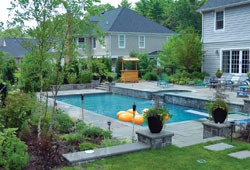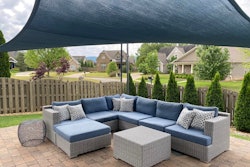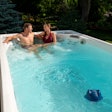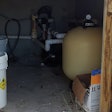
But that's not a good model because the water in a pool — and the organisms that grow in it — are definitely not in storage. Leanne Levy, technical service manager, BioGuard Pool and Spa Products, Lawrenceville, Ga., points out that chemical imbalances in terms of pH and calcium and metals can damage pools in winter as well as summer, and when winter temperatures allow, algae can grow and become just as big a problem when the cover is pulled off in spring as at any time of the year.
Levy puts all this quite succinctly. "Just because a pool is not in operation," she says, "doesn't mean it doesn't need to be taken care of."
Indeed, year after year, poorly winterized pools welcome summer's eager faces with algae, chlorine demand, degraded pool surfaces and sometimes even damaged equipment.
This notion of a pool in storage is just one example of how a customer's concept of a pool affects its maintenance — and by extension, the sales of a dealer's products and services.
Or, to put it another way: Shaping how a customer thinks about winterizing a pool can affect how successful that process is — for the homeowner in terms of enjoyment, and the dealer in terms of revenues.
Or, to put it a third way: Properly educating the consumer is everything.
An Easy Spring
A good example of a positive winterizing model is, "Let's make it an easy spring." This appeals to a customer's strong desire to take the stress and complication out of life. And it sounds nice. Everybody wants an easy spring, and all the customer has to do to get one is close the pool in the correct manner, either by purchasing winterizing products from the dealer or having the dealer's service department handle it.
Of course, in order to fully comprehend the idea of an easy opening, the customer must also understand the full range of outcomes. "Many consumers don't realize that it's possible to open to a problem that will delay swimming by several weeks or even a month while the pool recuperates from problems that occurred over the winter," says Levy.
"But you can use a lot of analogies to get the point across. In another way it's like insurance. You can pay a little bit now when you close it, or pay a lot more when you are facing a problem when you open it. That is, if you don't properly take care of your pool this fall, you're going to be in a chlorine demand situation in the spring, you could have severe algae, it could cost you quite a bit to get your pool back."
Another potent paradigm of pool care is the idea of "protecting your investment." The horror of money wasted through neglect is one that lies at the root of the homeowner's psyche, and leads him or her to buy a great variety of products, from premium paint to alarm systems. The instinct to protect the value of a pool is strong and well understood by any homeowner, and should be invoked as the season approaches.
Surface Risk
These themes can be useful in marketing winterizing as a whole, but a good closing is a matter of specific steps, diligently taken.
There are two main winterizing procedures, based on climate. In mild or Sun Belt zones, owners don't actually close the pool; they just change it over to winter operation, leaving the water level as it is and reducing the pump run time. But in an area where winter will likely bring a hard freeze, owners must drain the pool down below the skimmer, blow the water out of the lines and use antifreeze to keep them from being damaged.
In either case, whether the winter water turns stiff or stays fluid, balance is critical.
"If you have a plaster pool, for example, and you neglect the balancing of the water over the course of the winter, you can cause pitting and etching of the plaster, and once that happens, there's nothing you can do about it besides resurface it," Levy says. "And if you have a vinyl liner, and your water goes out of balance, you can cause staining and wrinkling of the liner. You might be able to stretch it back out, but most of the time, when the damage is done, the damage is done."
The importance of balancing the water fits with the concept of year-round pool care, Levy says. "You balance your pool water during the swimming season to have a more enjoyable pool experience, and to protect the equipment, protect the surface, and to allow your sanitizer to work more efficiently, but you still want that same balance during the winter months."
At Wolter Pool in Beloit, Wis., they use this first step of winterizing to demonstrate the expertise of the dealership. Employees at the store ask incoming customers with water samples what kind of pool cover they have, and then adjust the prescription accordingly.
Co-owner Kim Wolter explains: "In our area the rainwater is soft, and typically acidic. And if they have a mesh cover, that rainwater will go right through it, and tend to lower their pH and calcium. So when they close, we put in a little extra calcium hardness - we top that up to the high end of the scale. And we do the same for their pH; we try to get it up to the higher end of the range because we know that the rainwater will tend to make it drop. It gives them a little buffer for winter."
Clean, Chemically
Another key element of an easy spring, one that is often overlooked, is a good chemical treatment for the filter, Levy says. "People often forget to chemically clean their filter media before winter. It's important because bacteria and contaminants in that filter can set over the course of the winter months, and it will be more difficult to clean in the spring.
"And this goes for all filters - it's always best to chemically clean it during closing. Some people completely remove and discard the media, depending on its condition. Sand of course can last five to seven years, so you won't remove it every year."
At Wolter Pool, a display on the counter keeps the paradigm in the customer's mind. "As the season starts winding down," Wolter says, "we start putting up signs near the water test lab to remind people about closing and the process involved. We put up a Strip Kwik or Kleen It display on the counter. And then as we see people bringing in their water we say, 'Are you getting ready to close the pool? If so, you need to either change sand or use one of these products.'"
Chemical Insurance
The final step toward an easy spring is the addition of chemicals to protect the pool from staining, scale and algae. Of course, these can be sold and used individually, but as a package they make a lot more sense for the consumer.
"The winterizing kits make it simple," says Levy. "That ensures that customers have everything they need to get the job done."
With a pool properly closed for the winter, pool care is not necessarily finished until spring. Pools that have a mesh cover as opposed to a solid one, and are exposed to some warmer weather during the winter, run the risk of opening with algae or chlorine demand. So it's a good idea to apply a mid-winter shock treatment to these pools - cheap insurance against a green opening.
"We have recommended that," says Wolter. "We will tell people if you have a mesh cover you can add a little shock down through the cover - just mix it up manually and pour it through."
"Just make sure you pre-dissolve the chlorine," Levy adds, "especially if it's a vinyl-liner pool. This is important because you don't have any way of circulating the water once the shock is in the pool like you do in summer when the pump is working. All this assumes the water is not frozen. Of course, if the water is frozen, obviously you won't shock the pool. But if it's been covered for a few months, and you still have a few to go before spring and you've experienced some warm weather, then it's a good idea."
One of the best ways of marketing winterizing products and a dealer's image as an authority on them is to offer customers a seminar on the subject. This positions the dealer as the expert on the topic, and by inference reminds customers that closing time is drawing near and it's time to purchase the products that will ensure that trouble-free springtime opening.
Wolter Pool had a closing seminar last year, which was very successful. "We sent out direct mail pieces to all our customers before the seminar," Wolter says, "and it really went well. It wasn't necessarily a 'how to do it yourself' seminar. The message was: 'These are the processes of closing a pool and why we use them and what will happen if you don't.'"
Such seminars should be informative, but also serve the marketing plan of the dealership. In Wolter's case, that means it has to drive customers to its service department.
"Because our service department closes a lot of pools, and it's a big part of our revenue, far more so at closing than at opening."








































